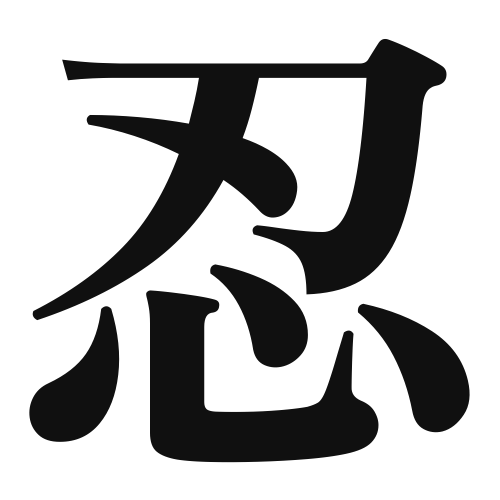1. Overview of Meaning
The kanji “忍” (pronounced “nin” or “shino-bu”) primarily means “to endure” or “to conceal.” It embodies the concepts of patience, perseverance, and stealth, often associated with the idea of enduring hardships or hiding one’s true feelings.
2. Formation and Radical
Formation of the Kanji: The kanji “忍” is a combination of elements that represent its meaning. It is classified as a compound character (会意文字), which combines the meanings of its components. The left part, “心” (heart), signifies emotions, while the right part, “忍” (to endure), suggests the act of enduring or hiding emotions.
Radical: The radical of “忍” is “心” (heart), which is often associated with feelings and emotions in various kanji.
3. Examples of Usage
Common Words and Phrases: Some frequently used words that include “忍” are:
- 忍者 (にんじゃ, ninja) – a person skilled in stealth and espionage.
- 忍耐 (にんたい, nintai) – patience or endurance.
Example Sentences in Daily Conversation:
- 彼は忍耐強い人です。 (かれはにんたいづよいひとです。) – He is a patient person.
- 忍者のように静かに動いてください。 (にんじゃのようにしずかにうごいてください。) – Please move quietly like a ninja.
4. Synonyms and Antonyms
Similar Kanji: A kanji with a similar meaning is “耐” (たい, tai), which means “to endure” but often emphasizes the ability to withstand difficult situations rather than the act of concealing emotions.
Opposite Kanji: An antonym is “暴” (ぼう, bou), which means “to expose” or “to reveal,” contrasting with the idea of hiding or enduring.
5. Cultural and Historical Background
Connection to Japanese Culture: The concept of “忍” is deeply rooted in Japanese culture, particularly in the context of the samurai and ninja traditions, where endurance and stealth were highly valued traits.
Proverbs and Idioms: One common saying is “忍の一字” (にんのいちじ), which translates to “the character for endurance,” emphasizing the importance of patience and perseverance in life.
